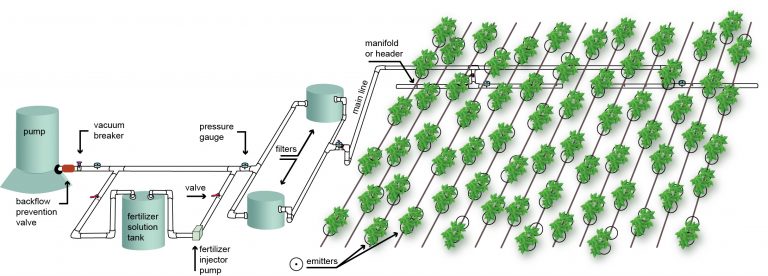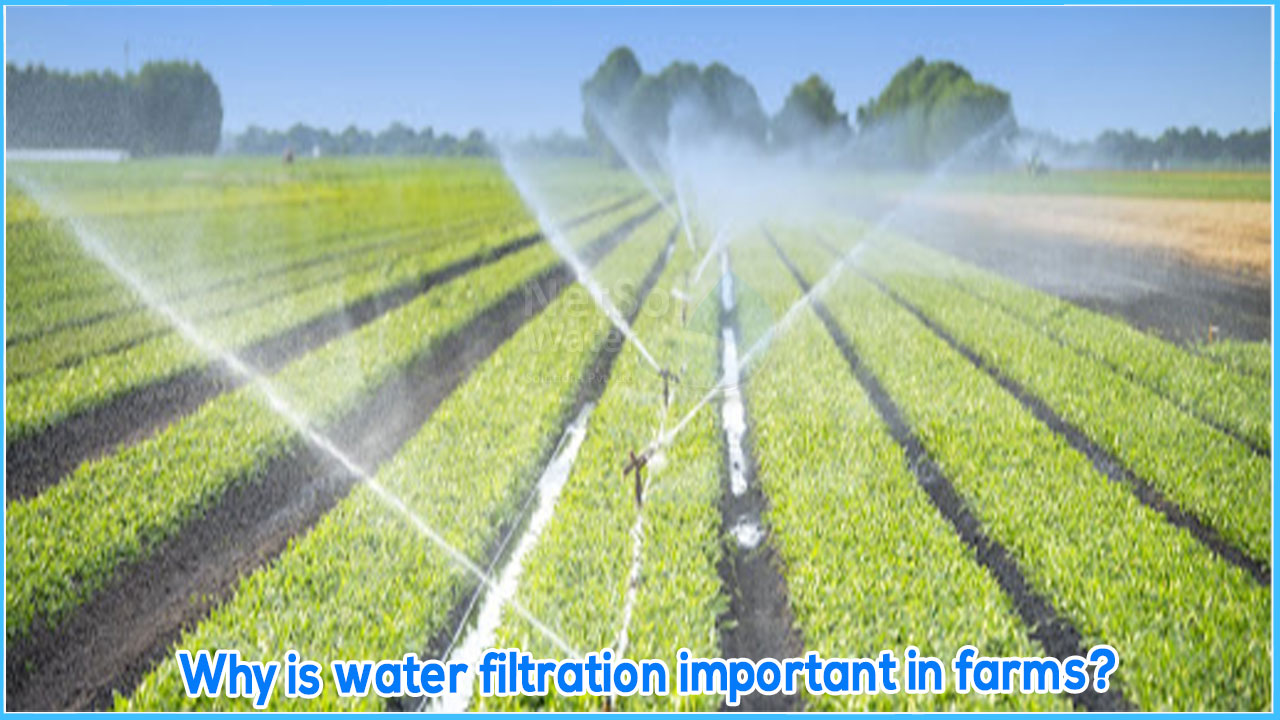Imagine stepping into a lush, vibrant garden where every plant thrives, each leaf glistens, and the soil feels just right underfoot. What if the secret to this thriving paradise lies not in exotic fertilizers or rare seeds, but in something as simple as water filtration?
If you’re managing an irrigation system, you know that water is the lifeblood of your plants. But have you ever considered what’s lurking in that water? Contaminants and impurities might be silently sabotaging your efforts. By understanding the importance of water filtration, you can protect your plants and maximize your yield.
This article will reveal how a clean water source can transform your irrigation system, ensuring your garden or farm not only survives but truly flourishes. Keep reading to discover the hidden benefits of water filtration and how it can revolutionize your approach to irrigation.

Credit: extension.okstate.edu
Protecting Plant Health
Water filtration in irrigation systems is crucial for plant health. Clean water ensures plants receive essential nutrients. Contaminants in water can harm plant growth. Filtering water reduces these risks. Healthy plants lead to better yields. Protecting them is essential for successful farming.
Reducing Contaminants
Water often contains harmful substances. These include chemicals, sediments, and pathogens. Filtration removes unwanted elements. This keeps the water clean for irrigation. Clean water supports healthy plant growth. Plants absorb nutrients more effectively. They become stronger and more resistant to disease.
Preventing Soil Compaction
Contaminated water can lead to soil compaction. This affects plant roots negatively. Compacted soil restricts root growth. It reduces air and water movement. Filtration helps maintain soil structure. It ensures water flows smoothly. Healthy soil leads to robust plant development.
Enhancing Crop Yield
Water filtration plays a crucial role in irrigation systems. It directly impacts crop yield. Clean water supports healthy plant growth. It ensures crops receive necessary nutrients without harmful contaminants. This leads to better harvests and increased productivity.
Improving Water Quality
Filtered water keeps harmful particles away from crops. Sediments, debris, and chemicals can damage plant roots. Clean water ensures safe irrigation. It protects plants from diseases and pests. This helps maintain a healthy growth environment. The result? Healthier and more abundant crops.
Optimizing Nutrient Absorption
Plants need nutrients to grow well. Clean water aids in nutrient absorption. Without impurities, nutrients reach plant roots efficiently. This ensures plants get the nourishment they need. It promotes strong growth and better yields. A well-nourished plant is a productive one.
Extending Equipment Lifespan
Irrigation systems are vital for agriculture. They deliver water to crops efficiently. But, without proper care, these systems can fail. One key to their longevity is water filtration. Clean water reduces damage and extends equipment lifespan. Let’s explore how filtration helps.
Preventing Clogging
Clogging is a common issue. It occurs when dirt blocks pipes and nozzles. Clogged systems can’t deliver water properly. Filtration prevents these particles from entering the system. This keeps water flow smooth and uninterrupted.
Reducing Wear And Tear
Unfiltered water contains debris. These can damage irrigation parts. Over time, this causes wear and tear. Clean water minimizes this damage. It reduces the frequency of repairs. Equipment lasts longer with fewer breakdowns.
Conserving Water Resources
Water filtration is crucial for irrigation systems. It helps conserve water resources. Clean water ensures healthier plants and efficient irrigation. Filtration removes impurities, reducing clogging in equipment. This maintains steady water flow and reduces waste.
Increasing Efficiency
Filtered water boosts irrigation efficiency. Systems work smoothly with clean water. No debris means less maintenance and fewer repairs. Efficient systems use less water, saving resources. Plants receive steady water supply, promoting healthy growth.
Minimizing Waste
Filtration minimizes water waste in irrigation. Removes sediments and pollutants. Cleaner water means less runoff. Reduces water loss through leaks and blockages. Proper filtration ensures each drop is used effectively.
Environmental Impact
Water filtration plays a vital role in irrigation systems, impacting the environment significantly. Clean water is essential for the health of crops and soil. Filtration removes impurities, protecting ecosystems from harm. The environmental benefits of filtration extend beyond agriculture. It promotes sustainable practices and reduces chemical runoff.
Reducing Chemical Runoff
Chemical runoff poses a threat to local water sources. Unfiltered water carries pesticides and fertilizers into rivers and lakes. This pollution harms aquatic life and drinking water quality. Filtration systems remove these harmful substances. Clean water prevents contamination and protects wildlife habitats.
Supporting Sustainable Practices
Sustainable farming relies on efficient water use. Filtration helps maintain clean irrigation water. It minimizes water waste and encourages responsible farming. By using filtered water, farmers promote healthier crops. This practice supports long-term agricultural sustainability. Clean water is key to conserving natural resources.

Credit: www.netsolwater.com
Cost-effectiveness
Water filtration reduces sediment buildup in irrigation systems, saving maintenance costs. Clean water ensures efficient plant growth, conserving resources and enhancing crop yield.
Cost-effectiveness is a critical consideration for anyone using irrigation systems. By investing in water filtration, you can significantly reduce costs over time. It might seem like an added expense initially, but the savings you gain in maintenance and longevity make it worthwhile.Lower Maintenance Costs
One of the biggest advantages of water filtration for irrigation systems is the reduction in maintenance costs. Clean water prevents clogging in pipes and sprinklers, which means fewer repairs and replacements. Imagine spending less time and money fixing breakdowns because your system runs smoothly. Unfiltered water can carry debris and minerals that accumulate in your system. This buildup can cause equipment to malfunction or wear out faster. By using a filtration system, you minimize these risks, ensuring that your irrigation setup remains efficient. Think about the last time you had to deal with a clogged sprinkler. It likely cost time, money, and probably a bit of frustration. Water filtration significantly reduces these occurrences, providing peace of mind and protecting your investment.Boosting Long-term Savings
Investing in water filtration isn’t just about cutting down immediate costs; it’s about boosting your long-term savings. A well-maintained irrigation system lasts longer and performs better, saving you money on replacements and increasing your return on investment. Consider the cost of replacing a major component in your irrigation system. It can be substantial. Filtration helps extend the life of these components by keeping them clean and functioning efficiently, delaying the need for costly replacements. Moreover, a filtration system can help optimize water usage. With fewer clogs and blockages, water flows more freely and reaches the intended areas more effectively. This improved efficiency can lower your water bills, adding another layer of savings to your operations. Isn’t it rewarding to think about how a simple step like water filtration can lead to significant long-term benefits? By focusing on cost-effectiveness, you ensure that your irrigation system not only meets today’s needs but also remains reliable for years to come.
Credit: www.instagram.com
Frequently Asked Questions
What Is The Purpose Of Using Filters In Irrigation?
Filters in irrigation remove debris and particles, preventing clogging in equipment. They ensure efficient water flow and protect crops. Using filters enhances irrigation system longevity and reduces maintenance costs. This leads to improved crop yield and sustainable water management. Proper filtration safeguards against contamination, promoting healthy plant growth.
Why Is It Important To Have A Water Filtration System?
A water filtration system ensures clean, safe drinking water by removing contaminants. It improves taste and health benefits. Proper filtration reduces exposure to harmful chemicals and pathogens, promoting overall well-being. Investing in filtration systems is crucial for protecting your family’s health and enhancing water quality at home.
What Is The Use Of Filter In Irrigation System?
Filters in irrigation systems remove debris and particles, preventing clogging. They ensure efficient water flow and protect equipment. Regular use maintains system longevity and optimal plant growth.
Do I Need A Filter On My Irrigation System?
A filter is essential for your irrigation system. It prevents clogs and ensures efficient water flow. Clean water improves plant health and reduces maintenance costs. Choose the right filter based on water source and system type for optimal performance. Regularly check and clean filters to maintain effectiveness.
Conclusion
Clean water ensures healthy plants and crops. Filtration removes harmful substances. This protects irrigation systems. Ensures long-term efficiency. Prevents blockages and damage. Makes maintenance easier. Filtration boosts crop yield. It promotes sustainable farming. Farmers save resources. They use less water and energy.
Filtration helps conserve the environment. Keeps soil fertile. Supports plant growth. Water filtration is essential for agriculture. It provides clean water. Ensures healthy growth. Encourages sustainable practices. A vital step for every farmer. Invest in water filtration. Secure your farming future.
Protect your crops. Choose clean water for irrigation systems.
